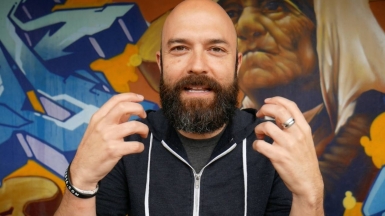
Picture this: a man writes a book about dating and sex (or the lack of), and accidentally creates an international movement. He becomes synonymous with his product, which is autobiographical and yet strikes a chord with an audience desperate to emulate his ways. He becomes the poster boy for a tried-and-tested way to pursue successful romantic interactions between men and women. The man sells many, many, books. Years pass. Controversy grows about the effect of the man's words on a generation of readers. Man reappears and suggests he might have been wrong. Can you guess who?
Actually, there are two names in the frame, and their stories go in very different directions. One is Josh Harris, home-schooled crown prince of the purity movement, author of I Kissed Dating Goodbye at the age of 21, and subsequent titles championing "biblical courtship". The other is Neil Strauss, author of The Game, and leading light of Pick Up Artists. If PUAs are new to you, imagine (only briefly, for your own sake) frustrated single men learning techniques to manipulate women into sleeping with them. Not the intention, claims Strauss, who says he wanted to advise his insecure younger self on how to fulfil his potential, but very much how it unfolded.
Both Strauss and Harris are significant figures within their cultures, lauded for mould-breaking insights on how men should treat women, and both are now hovering around the notion that they might have got it wrong. So what happens when a man who creates and profits from a movement dealing with deeply personal issues finds he no longer agrees with himself? A faith-based response, in Harris's case, and a secular, self-help led response from Strauss.

Strauss recently lamented that his words were not used simply as "the beginning of a men's self-improvement movement" but instead describes "terrifying" outcomes of violence against women and mainstream misogyny that have emerged from it, some verging on definitions of hate crimes. He adds that "as a social movement it is a failure because the biggest impact it has had on culture is to spread fear at a greater pace than it's spreading hope".
And yet. Rather than withdraw the book and distance himself from his creation, he is back with a new, improved version (this one claims "Jedi-level strategies", which seems entirely plausible). His new product – Inner-game, ahem – focuses on such things as treating and healing shame. While this fits with his recent writing about his insecurity and how conquests didn't fill his deep inner void, he is still unconvinced by monogamy – despite having a beautiful model wife, who he cheated on with her best friend early in their relationship. He says he "found love after looking in all the wrong places", an on-going narrative fixed firmly on his needs, and not the women who were harmed by men he influenced.
It remains to be seen how Josh Harris will respond to feedback. In my own research on how Christian culture teaches about sex and relationships, he and his books have been mentioned more than most. A tiny number have been positive tales, many more not. The anger – over lost opportunities to form relationships, to deep-seated damage over false guilt – is apparent. Still married to the woman he courted in his early years, Harris has asked for stories via his website and says he wants to assess the impact of his words. In a recent interview he spoke of realising the foundation of his life's work may have caused tremendous damage to others. He has apologised – kind of.
So why do these two men – one the poster boy for Christian purity, the other famous for developing a persona to sleep with women – seem to have more in common than one might expect? For both, women are right at the centre of their writing, and it is down to men to show them how to act and respond. Women are a problem to be solved – creators of lust in both cases, before views diverge into the pursuit of contact in one case, and rabid avoidance of it in the other. Kind of a Pick Up Artist and a Put That Away Artist. Harris, himself young and inexperienced back then, could argue that his intentions were good for all, though limiting. Strauss claims he was training men to be what women want, and this was manipulated.
There are lessons here about the importance of reflection, restitution, and use of power. Some Christians are suspicious of Harris's motives now – will he republish with amendments but the same core message? Will he profit again? Has he contractually given up the right to control his words? Strauss, who is up front about the damage his words caused, attracts little more than curiosity from the mainstream despite this. Sign up for his newsletter and he promises to send "controversial banned chapters" from The Game, so penitence seems far away. Both worldviews demonstrate that advocating extremes of anything aren't good when it comes to human relationships. Both are flawed responses to sexuality – either that humans are irrevocably damaged by any emotional connection ahead of marriage, or that male self-fulfilment comes from convincing women to engage in sex.
People tell stories of lasting harm from the purity movement, and it would be a counter-cultural move for Harris to be genuinely open to listen to those hurt by what he represented. It is a chance to show what even a fractured Christian community offers that the secular world would struggle to: willingness to engage, challenge, and change. Accountability to the people a writer hoped to influence would be radical too, and a humble approach to moving forward together. Where their paths diverge the most is in overall motivation. Neil Strauss still advocates building the self to serve the self. Josh Harris has a rare opportunity to take the lower ground and spark real change.
Vicky Walker is a writer, among other things. Her book 'Do I have to be good all the time?' about the meaning of life, love and awkward moments is available now. Follow her on Twitter.













